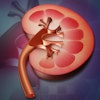CT has revealed that sarcopenia is a prognostic factor for poor overall survival after liver resection for cancer, researchers have reported.
Five-year overall survival was significantly lower in sarcopenic patients than in those without the condition, at 58.2% and 83.6%, respectively, a team led by Thanatchawan Polvieng, MD, of Phramongkutklao Hospital in Bangkok, Thailand, reported. The results were published March 22 in American Surgeon.
"Major postoperative complications were more frequent in sarcopenia," the group noted.
Polvieng and colleagues conducted a study that explored the prognostic impact of sarcopenia (i.e., loss of muscle mass) on overall survival, disease-free survival, and postoperative outcomes among patients with hepatocellular carcinoma who underwent surgery. The work included 83 patients with liver cancer who had surgery and preoperative abdominal CT between January 2010 and December 2020; the team identified sarcopenia by assessing skeletal muscle mass of the third lumbar vertebra using CT imaging and software analysis. Cutoffs for skeletal muscle index were 43.75 cm2/m2 for men and 41.10 cm2/m2 for women.
The researchers found the following:
- Sarcopenia was present in 39 of 83 (47%) patients who underwent surgery for hepatocellular carcinoma.
- Sarcopenia was a significant risk factor for poor overall survival, with a hazard ratio of 4.73 (reference, 1; p= 0.010).
- The condition was significantly correlated with lower skeletal muscle index, lower serum albumin levels, higher intraoperative blood loss, higher postoperative complications, and longer hospital stay.
- Five-year overall survival was significantly lower in sarcopenic patients than in nonsarcopenic patients (58.2% compared with 83.6%; p= 0.006), although five-year disease-free survival was not significantly different between the two groups.
The findings underscore the need for timely identification of sarcopenia among liver cancer patients, according to Polvieng and colleagues.
"Early sarcopenia detection and management may improve overall survival and clinical outcomes in postoperative hepatocellular cancer [patients]," they concluded.
The complete study can be found here.




















